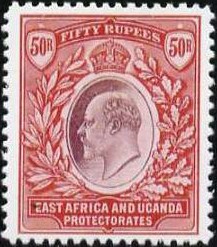 |
|||||
|
|||||
| Preview of Stamps Catalogue: VOLUME 1 |
 |
|||||
|
|||||
| Preview of Stamps Catalogue: VOLUME 1 |
The so-called Maryland forgeries were sold by Roger B. West (and only by him?) on Ebay in 2005-2006. He made a booklet on the St Helena forgeries of the first issues and made a forgery of these stamps himself in 1990. A quote from his pricelist:
"These modern forgeries wre introduced in 2003 through our Phoenix International postal auctions. When first offered, we received multiple bids for most items with bids of up to £50."
Maryland forgeries are mostly forgeries of rare stamps and misprints of Britain and his colonies.

Example of a Maryland forgery of the 50 R value of East Africa
and Uganda Protectorates of 1903
In the March issue of American Philatelist (2006?), Jim
Griffith has a letter to the editor posted in response to Roger
West's recent letter regarding the sale of "Maryland
Forgeries" and the products of ATDinvest. The letter is
repeated here:
In the January Letters to the Editor column, Roger West makes
a compelling argument for the sale of "Maryland fakes"
and similar material ("Buying Forgeries," page 8). Much
as I dislike these modern reproductions, I concede that people
have as much right to make, sell, and buy them as they do Pez
dispensers, Beanie Babies, or any other item to which people have
assigned arbitrary value. I'm not comfortable with the way these
dealers imply through association that these reproductions are
somehow philatelic in nature, but that's a question for wiser men
than me.
Here's where I disagree with Mr. West. He may mark them with
"forgery" on the back. He may even describe them as
"modern reproductions," but why doesn't he actually
tell buyers that what they are purchasing is
"computer-generated within the last six months"? The
answer is obvious - even the most inexperienced collector would
never bid in an auction against another bidder for something the
seller might produce at virtually no cost in virtually infinite
quantity. Such a collector need only wait for the next
"printing."
If dealers wish to sell these modern constructs at shows or on
websites, accurately described, for whatever price, so be it. But
when a dealer fails to identify these items as recently computer
generated, or when he encourages buyers to bid against each other
for something that can be produced at will at little cost, he is
guilty of "false or misleading claims of sales scarcity,
value" - a violation of APS ethics.
Jim Griffith
Sunnyvale, California